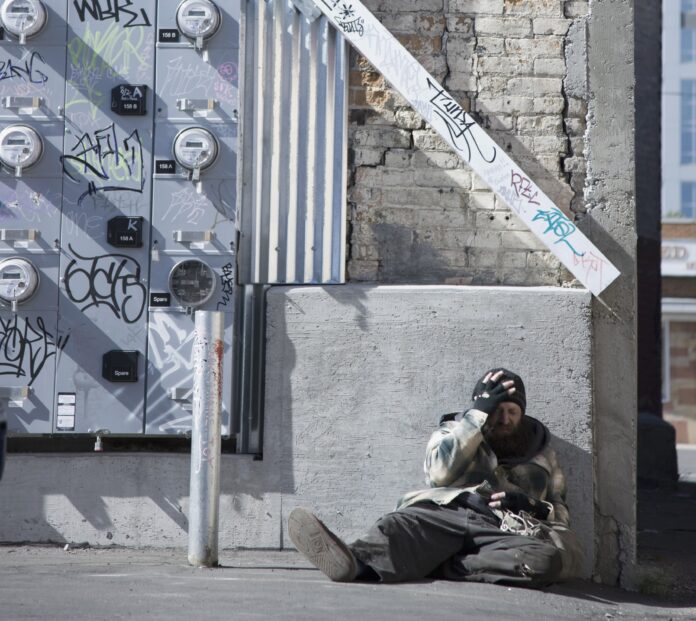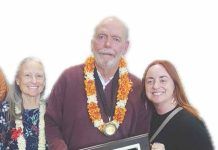John Brady is the director of Lived Experience Advisers, a non-profit organization which recruits and trains people with lived homelessness experience to share their stories with government leaders, the community, academic and professional groups across the county to change the perceptions of homelessness.
Often, Brady said, a community’s perspective on homelessness comes from law enforcement at planning groups “because they have a job to do with addressing crime” but their viewpoint doesn’t tell the whole story.
Police often do not define homelessness as a social issue but as a personal choice, Brady said, and therefore does not entirely reflect what creates homelessness and what it takes to house unsheltered residents.
“We have advocates, consultants who interact with about 30 boards across the county. All are highly active and speak at community groups and public events, they’re extremely comfortable sitting with Metropolitan Transit Services, the county board of supervisors, and planning groups across the county to put a face on homelessness,” Brady said.
In his own life, Brady worked as a financially successful executive level advisor, lived through a downward economic spiral that rendered him homeless and redesigned his life after serving as an advocate with Voices of the City homeless choir.
“I came from a very Republican family who believed people on the streets could pull themselves up by their bootstraps. Then, I discovered that’s not true— there’s ongoing trauma being on the streets and I realized six years ago the services were wholly inadequate. I saw a national trend in leaders seeking out people with lived experiences and thought we needed to pay people an expert wage for that guidance, for bringing their insight to the table,” Brady said, so he set up an initial group which grew into LEI.
Although there are differences between neighborhoods in different parts of the county, Brady said the organization doesn’t differentiate their outreach by municipality or county district as much as they differentiate their messaging to varying groups they address.
For example, he said, San Diego County Board of Supervisors representative Nathan Fletcher and Regional Task Force on Homelessness CEO Tamara Kohler asked LEA to speak at a family shelter and health center opening earlier this year “because there was backlash from the community and we might get people to retreat with their pitchforks,” by sharing personal stories, Brady said.
In a less public approach, several LEA consultants will be sitting in on a planning group meeting next week, Brady said, prepared to informally share their viewpoints from the audience.
“One thing I should mention is there are many advocacy groups out there that are highly critical of what’s happening to our homeless population and are prone to being more aggressive in their approach; we focus on the system and structure,” Brady said.
A significant percentage of their current consultant pool has been involved with some level of advocacy for a good period of time, Brady said, but they recruit on a continuous basis and sometimes see newly housed individuals connect with the organization and rapidly become active advocates.
“A lot of times people refer individuals to us because they see that person wants to advocate. For every five to 10 who initially connect, maybe one or two will stick with us for the long run,” Brady said, but he considers that a good thing as it indicates growth.
“We train speakers to serve as advocates but we also encourage them to develop their own personal business relationships and the hope is that they will develop their own ventures. We see many of our members being invited to do gigs with a college or a group and that becomes another revenue source for them,” Brady said.
The growing organization just developed a formal, two-month long training program which exceeds the ongoing recruitment and development they already have in place.
“For the first month, we introduced people to elected officials from local municipalities to the county supervisors to California State Assembly member Chris Ward as well as regional leaders in homelessness. We also had other outside experts come in, largely to establish how homelessness is addressed at a state or local level,” Brady said.
The second month of their newly established program focused on “telling the story of self” with guidance on how to interview with the press and how to activate social media,
Brady said. In the future, he said, LEA will be utilizing a three-year grant they received “to pay people to speak in front of community groups, legislators, faith-based educators and anyone at state level” and put a face to homelessness.
“We have metrics we report back to our funders in terms of speaking engagements, the number of comments with legislators. We track those numbers and we try to work with planning groups and the county as legislation and policy is being developed,” Brady said.
Some members of LEA have also participated in various university programs as guest lecturers or parts of work groups that address or statistically evaluate homelessness programs; for example, Brady has guest lectured at San Diego State University with the intention of illustrating lived homelessness experience for emerging leaders who plan to seek a career in politics.
“Our primary benefit is humanizing the homeless population and the experience of homelessness,” Brady said.
The group is “constantly putting pressure on cities and the county to increase affordable housing” and focuses on seniors, residents on disability, and veterans.
“The end of homelessness begins with a home— everything else is ancillary,” Brady said, although he sees the county needs more service providers.
“With services, it’s not that the money isn’t there, it’s that the staff isn’t there. If you look across the major homeless service providers there’s over 100 openings. We need to be attracting high quality individuals and retaining them and there’s far too much turnover at the front line,” Brady said, which undermines the connections between homeless individuals seeking help and social service workers.
Compounding the problem, he said, the economic effects of the pandemic have drastically affected regional goals to reduce homelessness with numbers now going up instead of down.
“For every 10 people we place, 13 are entering homelessness and I see this problem becoming worse before it gets better,” Brady said.














